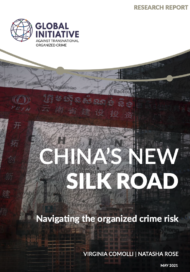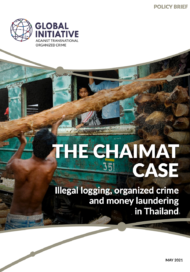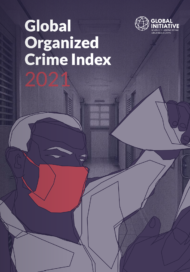Posted on 15 Nov 2021
Cronyism and criminal actors may benefit from the China–Pakistan Economic Corridor, a vast joint infrastructure project between China and Pakistan, forming part of Beijing’s Belt and Road Initiative. Vulnerable communities meanwhile are set to be left behind.
While the China–Pakistan Economic Corridor (CPEC) has been touted as an economic catalyst for Pakistan, it also represents a significant business opportunity for transnational organized crime actors in South Asia. The upgrade of existing, and creation of new, transportation infrastructure has the potential to facilitate increased illicit flows, as is anticipated with other regional components of the Chinese Belt and Road Initiative.
Local populations adversely affected by the CPEC may also contribute to a rise in illicit activity. Although there are hopes that the CPEC will generate jobs, it is probable that the corridor will not strengthen and stabilize the Pakistani middle and working classes (there has, for instance, been no progress on CPEC agriculture-related initiatives). Rather, the project is more likely to have disruptive effects on local micro-economies, which will add to Pakistan’s unemployment burden and potentially widen the gap between rich and poor provinces, leading to increasing participation in illicit markets and political protests. The CPEC’s failure to improve living conditions may also bolster the appeal of religious militancy, which has attracted sections of Pakistan’s economically frustrated youth population since the early 1990s, when large numbers of low-wage migrant workers were compelled to return from the Persian Gulf states.
The main beneficiaries of CPEC will probably be military-run businesses, especially on the Pakistani side, and conglomerates with government connections. These businesses will perpetuate existing patterns of crony capitalism that have played a considerable role in limiting the opportunities of less privileged, smaller enterprises.
Focusing on the positives, ignoring the negatives
The Pakistani state apparatus has been keen to emphasize the upsides of CPEC and ties with China, and downplay or ignore the adverse human impact. A flood of photo-ops of dignitaries inaugurating CPEC projects and speculative reporting about the future benefits of the corridor are part of a conscious state strategy to drown out stories like those about human traffickers moving Pakistani victims to China to harvest body parts. Likewise, the media is allegedly discouraged from reporting cases about vulnerable women being trafficked by Chinese networks (which allegedly operate through local Pakistani helpers) for illegal marriage, prostitution and forced labour.
The negative impacts of the CPEC may be broad as well as egregious. In August 2021, one Pakistani academic noted that ‘CPEC has exacerbated existing class, ethnic-national and ecological divides within Pakistan’ – views rarely articulated in public discourse due to fear of state repression. The main winner is likely to be the military, which together with its associated commercial enterprises assumed a leading role in the corridor’s infrastructure projects following the ousting of prime minister Nawaz Sharif in 2017. In this respect, the CPEC can be seen as merely the latest expansion of ‘military-business’, which has long been a fixture of the country’s political economy and limited the growth of the private sector.
The involvement of the Pakistani military and associated enterprises in the CPEC is similar to the role played by the Xinjiang Production and Construction Corps, a Chinese state-owned and quasi-military organization responsible for pacifying the frontier areas of Xinjiang. The comparison is not exact, as the military in Pakistan is considered to be far more assertive in matters of policymaking vis-à-vis a weak civilian establishment than its counterpart in China, where the communist party retains paramountcy. Yet, there are similarities, in that the Pakistani military’s business empire mirrored that of the People’s Liberation Army until the late 1990s, when the latter were compelled to mostly withdraw from managing for-profit enterprises (something the Pakistani army did not emulate). The fact that the Pakistani army is responsible for implementing many of the subsidiary projects of the CPEC also makes independent scrutiny of the project’s societal impact difficult. This is because the CPEC is deemed a matter of ‘national security’ by the military and hence probing the exact terms of business deals that are signed under the framework of the corridor is discouraged. Yet, it can sometimes be such terms that decide whether or not the CPEC benefits wider communities or just narrow elite interests. For example, policy opacity makes it challenging to distinguish between business opportunities generated for Chinese firms as opposed to those benefiting local entrepreneurs in Pakistan. For example, according to Chinese media, construction work for the biggest rail project under the CPEC, known as Main Line 1, may bring 150 000 jobs for local Pakistanis (the claim of the Pakistan minister for railways), but is open only to Chinese bidders.
The case of Gwadar: loss of legal livelihoods drives turn to crime
Gwadar is a port in Balochistan, Pakistan’s largest and poorest province, which is host to a long-standing separatist movement. Owing to the province’s location on the Makran coast, and with a northern border along the porous frontier with Afghanistan, Balochistan has long been favoured by Afghan- and Pakistan-based drug traffickers, who use Gwadar as the launching point for vessels carrying heroin and methamphetamines to the drug markets of the world. In recent years, a number of drug shipments have been intercepted in the Arabian Sea that have been traced back to Gwadar, including one bust of 1.5 tonnes of heroin in July 2017.
What was once a fishing village now has a ready supply of seamen willing to ferry illicit cargoes to foreign shores, in part due to a series of pro-China state initiatives in the area that have undermined local livelihoods. Gwadar has become a Chinese outpost on the Arabian Sea. Gwadaris’ economic suffering was exacerbated in the 2010s, when the Pakistani government allowed Chinese-owned trawlers to deplete local fisheries, resulting in large-scale job losses that had a severe impact on fishing communities.
When the CPEC was announced in 2015, Gwadar was retrospectively incorporated into the larger plan for Chinese investment in Pakistan, part of the Belt and Road Initiative. However, most jobs associated with the port went to applicants from outside Balochistan. In June and August 2021, there were protests in Gwadar against Chinese fishing operations. If Gwadari concerns persist and are not adequately addressed by government officials, more members of marginalized fishing communities might out of sheer desperation turn to smuggling drugs and humans to make a living.
Increasing opportunities and motivations for criminality
The expansion of road and railway infrastructure under the CPEC will also offer opportunities for expanding illicit trade. CPEC developments in the Khyber-Pakhtunkhwa and Sindh provinces primarily involve new stretches of highway that are being built to link Pakistani cities, which will also strengthen links with Afghanistan. Since the 1960s, overland trade between Pakistan and Afghanistan has been dominated by a ‘Pashtun trucking mafia’ (a sub-group of this mafia, known as the Quetta Alliance, is thought to have used drug money to fund the initial rise of the Taliban in 1994–1995). According to a senior expert at the International Crisis Group, the Pashtun mafia is reported to have invested extensively in real estate in Karachi and acquired influence in the city’s large seaport. During the Soviet-Afghan War in the 1980s, the port was an exit point for heroin trucked from the Afghan frontier by Pakistan’s military-run National Logistics Cell for onward shipment to the international market. The National Logistics Cell is also one of the key stakeholders in the CPEC.
The CPEC is projected as a solution to problems of poverty and underemployment. However, when new jobs prove hard to come by and traditional farming- and fishing-based livelihoods are lost, it is more likely these new jobs will be found in the illicit economy. Together with regional instability rising as a result of developments in Afghanistan, the future looks grim for those wishing to see a reduction in political and criminal violence through trade-based prosperity. Overall, the CPEC looks more likely to further drive these trends than to offer an economic solution.



